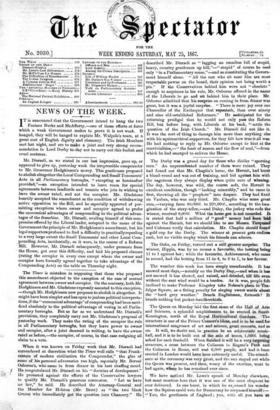When it was known on Friday week that Mr. Disraeli
had surrendered at discretion what the 7Tmee well calls "that Frank- enstein of modern civilization the Compounder," the glee of some of his personal adversaries ran high, especially Mr. Bernal Osborne's, whO came in from dinner in his best chaffing mood. He congratulated Mr. Disraeli on his "doctrine of development." He protested against the efforts of the Conservative lawyers to qualify Mr. Disraeli's generous concession. "Let us have no law," he said. He described the Attorney-General and the Member for Helston (Mr. Brett) as "the two black Graces who immediately got the question into Chancery." He described Mr. Disraeli as "lugging an omnibus full of stupid, heavy, country gentlemen up hill,"—" stupid" of course he used only "in a Parliamentary sense,"—and as constituting the Govern- ment himself alone. "All the rest who sit near him are moat respectable pawns on the board, their opinion not being worth a pin." If the Conservatives behind him were not " obsolete " enough to acquiesce in his rule, Mr. Osborne offered in the name of the Liberals to go and sit behind him in their place. Mr. Osborne admitted that his surprise on coming in from dinner was great, but it was a joyful surprise. "There is more joy over one Chancellor of the Exchequer that nspenteth, than over ninety and nine old-established Reformers." He anticipated for the returning prodigal that he would not only pass the Reform Bill, but before long, with Liberals at his back, settle the question of the Iriah Church." Mr. Disraeli did not like it. It was the sort of thing to damage him more than anything else with his squirearchical supporters, for they felt how true it all was. He had nothing to reply to Mr. Osborne except to hint at the convivialities,--" the feast of reason and the flow of soul,"—from which he had emerged to enliven the House.






























